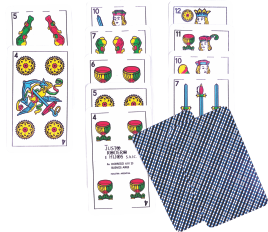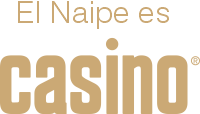
The MUS is a game of Basque origin, two couples or companions play it, using packs of 40 cards. The players must sit down frontwise and intercalated with the oposition. The games are the following: First” Grande”; 2ºnd” Chica”; 3rd.” Pares”; 4th” Medias “ Fifth” Duples ;” 6th.” No juego”; 7th. “Juego”;.
Value of the cards
The principal card is the King, taking into account that it can be played with 4 Kings and 4 Aces, but, generally, with 8 Kings and 8 Aces, in which case, the threes act as Kings and the twos as Aces. That is, King and Three, Queen, Jack, Seven, Six, Five. Four, Aces and Twos, taking into account the the Kings called “de Capa” have the same value than the Threes and the Twos the same that the Aces for all the games.
To sum up points:
Kings. 10 points
Threes, 10 points
Queens, 10 points
Jacks, 10 points
Sevens, 7 points
Sixes, 6 points
Fives, 5 points
Fours, 4 points
Twos and Aces, 1 point
Tricks
GRANDE: When they have cards of more value, like Kings, Threes and Jacks.
CHICA: Is when you have the smaller cards, like Aces, Twos and Fours, etc. PARES: They can be simple like two Kings, 2 Aces, 2 Fours, etc.
MEDIAS: Is when you have 3 cards of the same number, like 3 fours, 3 twos, 3 sixes,etc.
DUPLES:: They are two couples like 2 Sixes and two Jacks, two Kings and two Aces, they can be 4 similar cards, like 4 Jacks, 4 Aces, etc.
NO JUEGO : When the cards available don´t reach a sum of 31 points, in this chance the best point is 30 and descends up to 4, which is the worst. This chance does not take place when one of the players has game.
JUEGO: Is when one has 31 or more, being 31 the best point, following, 32 and from it you jump to 40, decreasing to 37, 36, 34, and 33 which is the worst one. The MUS with 8 Kings and 8 Aces, is normally played with 40 points or 8 “amarrecos”. There are no triumphs nor distinction of suits. .
Variations and Rules
The dealer must shuffle well the cards and deal to cut on his left. He can´t not pick up less than three cards nor leave less than three. He will deal the cards one by one starting by the right, and alter having given one to each player, he will continue to give a second one, up to four.Then the hand will talk, and the one to his right will follow suit. In the case the hand would want to discard, he will say “Mus” and the rest of the players will continue talking. If they all say “Mus”, the discard is done, distributing to each one as many cards as discarded and finishing by the dealer serving himself. If any of the 4 players does not want to discard and says: There is not Mus, nobody has the right to discard.The discarding can be repeated as many times as the 4 players want, and in the case of the cards having finished, the ones that have been thrown will be picked up.Once finished the discarding, the Hand will talk and say “I Pass” or “Envido”, followed by the one to his right, starting by “Grande”, “Chica”, “Pares” or “Juego”. The hand will win the game when the opponent has similar cards or throws..No word refering to the game must be inanvertedly pronounced, because it obliges to hold it, even if it can cost the game. Every renunciation of the trick or “pares” is punished, whoever the player, with the loss of one point, because if another has it, it is considered as if he had not acepted the former´s invitation.
VALUE OF THE MOVES
First – The “No”
Second – The” Grande”
Third –“ The Chica”
Fourth –“ Pares,”” Medias,” and “ Duples”
Fifth –“ No juego”
Sixt –“ Juego”
This is very important, because al always it must aim at the No first, and this indicates not having wanted the “envite “or” ordago”, bearing into account that the “envite” doesn´t loose game, although it be bigger the number of points “envidados” that the ones agreed on the game. For example: If two companions are lacking one point and throw 40 to “chica” or “pares”, and these were accepted by the oposition, even if these win, if when reaching the game they threw “ordago” and the oposition did not accept, the first point to jott down would be “No” and therefor they would win the game. For this and many other cases, things must well thought before doing the “envites”.When doing a “querite” of “ordago”, the cards will be uncovered and the player with more game will win.
VALUE AND ORDER OF THE POINTS
First. The” No,” which is worth 1
Second: The” Grande,” which is worth 1
Third. The” Chica,” which is worth 1
Fourth. The “ Pares,” which are worth 1
Fifth. The” Medias,” which are worth 2
Sixt. “ The Duples “ which are worth 3
Seventh.” No Juego,” which is worth 1
Eighth..” Juego” of 31 that is worth 3
Ninth. The rest of the games of 32, 40, 37 to 33 that are worth 2
In the “Grande” and in the “Chica” and not having “envite”, the winner will only jot down 1 point ; If there were “envite” and it is not wanted, it will take the No, but without accounting any points , both for “Grande” and “Chica”..
No game. If there is no “envite”, it will be taken by the highest with one point and if there is “envite” is wanted he will take the No and one point whoever did the “envite”. In “pares”,”medias”, “duples “ y “juego”, if there is no” envite” the points will go to whom wins the throw, adding up the points that by” pares”,”medias”,”duples” or “juegos” his companion might have, if there is no “envite” and it is not wanted, he will take a point of No. Not to want an “envite” means to renounce to the trick.Therefore the valid points, whether by parts o game, will be the one that made the “envite”.
THE SCORE
The score must do it one of the partners of each couple, as every two players go combined and the other two are against, in the way the account is simplified.The ones to take the escore, take from the middle of the table as many chips or coins as many as they win or their companions, and they will put in front of them so that it can be appreciated what each one has.
When doing the account, the attention of the oposition must be called for them to verify the escore, having to say how many are taken and why.When the ones that do the escore have before them five chips, the say “un amarreco”, and the companion in front jotts down a chip, or if is between two, he puts it to his right or his left, for them not to be confused with the easy points, and the other four are thrown in the pile of chips.
If ones and the others finish the game at the same time, the points are counted according to the category of the players, that is, the one who wins the big one, if with that he has enough number of points, he withdraws before the others and so suscessively the one who has the right in the following chance by order of categories.
The player that did not jot down some points of the ones he has won, before shuffling and lifting by the following hand, looses the right to collect them when the cards are cut to deal the cards for the next game.
Phrases
MUS
The word “Mus”, indicates that one wants to discard one or all the cards he has received, which he will not declare until all the players have talked to see if they accept the discard, in which case, done this, the hand repeats the word “mus” until some player interrupts saying “ no hay mus”.
PASO
Means that there is no intention to discard or “envidar” and the players continue talking to know if they all pass or no.
ENVIDO
Means to bet a certain number of points to the corresponding chance, starting by the “grande”, followed by the “chica” and so on according to the refered order. If only “envido” is said, it means that only two points are bet.
ENVIDO Y YO
Is the reply to the two points that the player that says “envida”, with the other two more that the one that replies bets.
QUIERO
It is said when the offered bet is acepted, remaining in suspense until seing the cards, to determine who wins the corresponding bet to the throw or episode that called “envido” and was wanted.
NO QUIERO
The contrary to “quiero”. If at the first “envite” of each trick it is answered “no quiero”, the one that “envida” jots down a point.
Ordago
Means betting all the points of one game, that is, all those agreed on. In the “envite” of “ordago”, there is usually a doubt produced by the difference of points the players might have, but the rule generally followed, is that the admited “ordago” decides the game for who wins it.
Signs
It is interesting to let your companion know the game you have, looking after that the opponents do not know, for this some agreed on signs are used, that must be done with a lot of precaution for them not to be seen.
The most common ones are:
To indicate to give or ask for mus: the closed lips are extended forward.
For it not to be given ot withdraw it: the head is inclined towards the right.
To indicate that there are cards for the chance of the “grande”;
- If it is of King, you bite the lower lip.
- If it is of Queen, you blow softly.
- Being two, both Kings or Queens, the signs are repeated.
The Chica
- If is of Ace: you take out the point of the tongue.
- If is of Two: it is moved to the sides.
- When they are two the signs are repeated.
For the” pares:”
- If they are simple: the lips are bit twisted to the right.
- If the are “medias”: much more.
- If they are “duples”: they are moved to both sides.
- For the game of 31 you wink the right eye.
- If they are 32 the left eye.
- For the 40 you raise it and for the others, you move the head from one side to the other.
- To indicate to your companion to do an “envide” or to “reenvide” more points, you raise your head. These signs can change, agreeing with your companion to avoid that they be recognised by the oposition.
